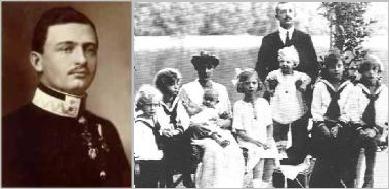
He forbade the bombing of civilian and cultural targets. He made peace initiatives in 1917 and was arrogantly rebuffed. Again, on Oct. 16 1918, Emperor Karl issued a manifesto proposing the federalization of the Austrian half of the Empire on the basis of self-determination. In Washington, Czechoslovakia’s T.G. Masaryk feared the Western Powers might negotiate with Austria on this basis, so he issued a declaration of Czechoslovakian independence. He need not have worried. President Woodrow Wilson and other Western leaders did not have any intention of negotiating with “Emperor Charles” or coming to a diplomatic and just solution.

Although the Entente provided a pension to the family who initially relocated to Madeira, it was sufficient only to cover necessities. One cold March day, Karl travelled into town to buy his children toys and came home ill. Severe pneumonia set in. He died at age 34 on April 1, 1922.
Archduke Karl married Zita von Bourbon-Parma on October 21, 1911 and together they had eight children, starting with Crown Prince Otto born in 1912 who became pretender to the throne at age ten upon his father’s death. Zita was accused by critics of goading her husband to regain the Hungarian throne, where the monarchy from which he had not abdicated had been re-established under a Regent after the end of the war. After Karl’s death, Zita, who spoke five languages, lived in France, Spain, Belgium, Canada, and the USA. She died in Switzerland in 1986. She was buried in the first Habsburg royal funeral at Vienna’s Imperial Crypt in 70 years.
Her funeral was attended by politicians, state officials and international representatives, including a representative of the Pope. In 1994, Karl’s coffin was opened in Madeira, and his body did not appear decomposed. The Vatican proclaimed him “Venerable,” or just shy of a Saint, in 1998. On December 22, 2003, the Vatican had recognized a miracle performed in Karl’s name. On October 3, 2004, Karl the Venerable became Karl the Blessed, as the Church announced the beatification of Karl von Habsburg.
Karl’s eldest son, Archduke Otto, petitioned the Austrian government in 1961 to be allowed to return to Austria as a private citizen and his request was granted in 1963. He later became a West German resident and a representative to the European Parliament.
Zita always believed that the death of Crown Prince Rudolf at Mayerling in 1889 was not a double suicide, but rather murder by French or Austrian agents, and in fact subsequent examinations have cast serious doubt on the official explanation of the deaths.